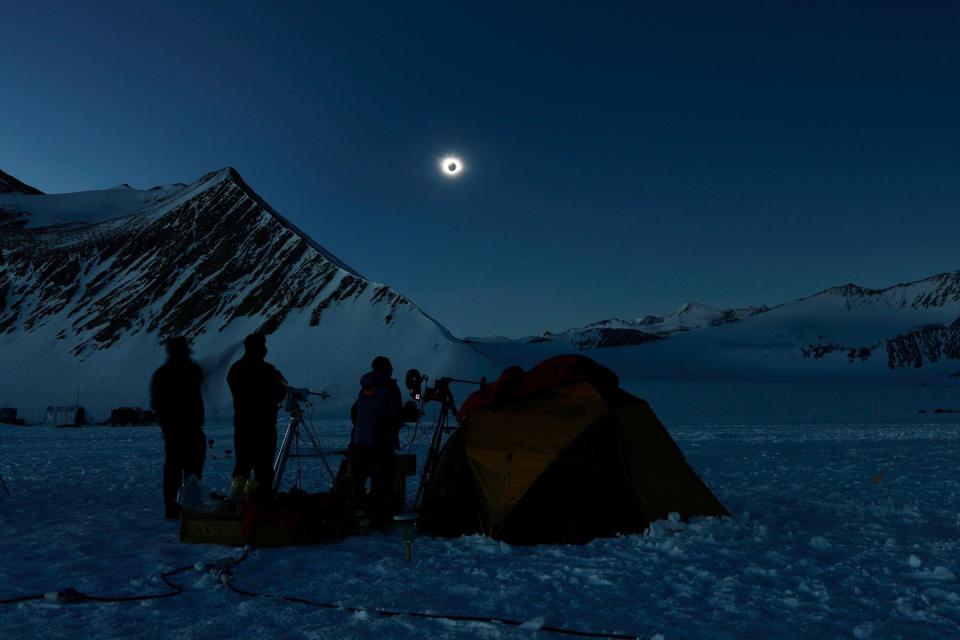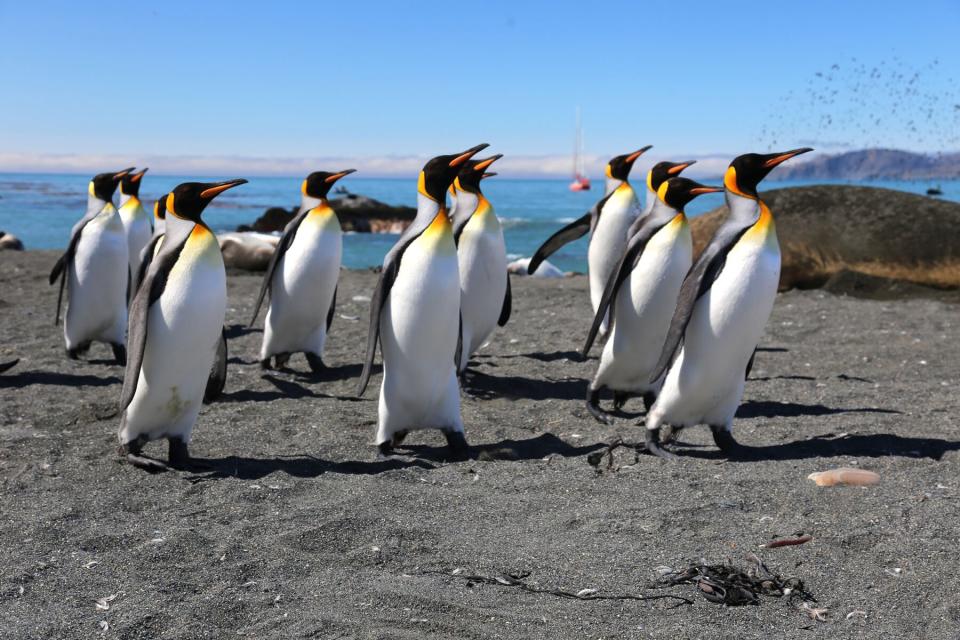I Cruised to Antarctica to See a Solar Eclipse — and It Was the Trip of a Lifetime
The most exciting trips often combine a visit to a dreamed-of destination with a unique event. Add a dose of pandemic-era jeopardy and 200 intrepid travelers and the stage was set. For the guests on the maiden voyage of Ocean Victory this was such a trip — a visit to Antarctica, the seventh continent, coinciding with that most beautiful of celestial events, a total solar eclipse.
I was lucky enough to be lecturing about the eclipse on board to a ship consisting of intrepid travelers, eclipse-chasers, and Virgin Galactic ticket holders. It was the trip of a lifetime.

FELIPE TRUEBA/Imagen Chile/AFP via Getty Images
South Georgia and the End of the World
Arriving in Ushuaia, Argentina — the southernmost town in the world that calls itself El fin del mundo (the end of the world) — it still seemed unreal. To get to the jetty where the ship, the Ocean Victory, was moored required "bubble" bus transfers and COVID-19 tests. Some guests failed and never got to the jetty. That's the reality of pandemic-era travel — so too COVID-19 tests for all guests every three days during the 14-day journey.
The cruise began with a 1,600-mile schlep to South Georgia, a sub-Antarctic island that's rarely visited by cruise ships in November. A range of impressive lectures were delivered and majored on IAATO guidelines on how to leave only footprints on the Antarctica continent; we had to scrub our boots and were not to touch anything when eventually we landed, via inflatable zodiacs, at the rusting whaling station at Grytviken. A visit to the grave of legendary Antarctica explorer Ernest Shackleton was notable not only for the location, but for the aggressive Antarctica fur seals fighting all around the tiny cemetery.
If Grytviken was intriguing, Gold Harbor was jaw-dropping; to stand on a narrow beach surrounded by 250,000 king and gentoo penguins, Antarctica fur seals, and massive elephant seals — not to mention three glaciers peering down from above — was heart-stopping in its wonder. Some guests were moved to tears. Others fell silent. Everyone was in shock at our incredible privilege.

Jamie Carter
The Solar Eclipse Experience
With South Georgia explored it was time to sail into the "path of totality," where the moon's shadow would sweep across at precisely 5:04 a.m. on Saturday, Dec. 4, 2021. We knew the sky would darken during the eclipse, but would we get a clear view of the "hole in the sky" and see the sun's incredible corona? A cyclone prevented us from going south, but the further north we went the lower the eclipsed sun would be on the horizon. Pinpoint accuracy was required.
The forecasts showed a gap in the clouds to the north so we raced towards it, but forecasts mean little in the Scotia Sea. We stood on deck under clouds as the shadow of the moon struck us. The temperature — already around freezing — noticeably plunged, as did the light as we aligned with the moon and the sun for one minute and 35 seconds. It wasn't quite the experience we had hoped for, but it remained a profound and bizarre feeling to witness something so huge in scale. "It was a beautiful experience, I got goosebumps all over my whole body during totality," said Lucas J. Mudskipper, 59, an eclipse chaser from San Francisco. "Just as amazing as totality was coming out of it, it was crazy and it happened so fast."
Not everyone on board was an eclipse chaser. "I didn't come for the eclipse, it was just a coincidence, but I got on the boat and met so many people who had huge transformations after seeing an eclipse," said Alessandra Capurro, 24, from near Florence, Italy. "It was impressive to see the darkness. Even with the clouds it felt like you could close the sky and put a curtain over the sun. It didn't feel real." That was true of the whole trip.
Conquering the Seventh Continent
Minutes after the eclipse had finished, the captain turned the ship around and raced south. The goal, of course, was stepping on the Antarctica Peninsula. Would we get there in time to make a landing … and avoid the cyclone that was in our way? The captain managed both, and after visiting the Adelie penguins on the remote and rarely visited Heroina Island and Paulet Island and sailing between tabular icebergs alto 63º south, we woke up just offshore Brown Bluff.
This was mainland Antarctica. We duly set foot on Antarctica proper, and our journey was complete. We had seen many wonderful sights along the way, but the fleeting sight of a gentoo penguin chick that had just hatched being fed by its parent was a magical moment. It was one to eclipse all the others.

Jamie Carter
Aboard the Ocean Victory
A modern ship on its maiden voyage — thanks to COVID-19 delays — the Ocean Victory has an odd look about it. An X-Bow design with hydraulic stabilizers, it was able to glide through large waves and stay reasonably stable (though the two nights of 11-meter waves in the Scotia Sea will remain unforgettable). A ship with 93 staterooms, 90% with a balcony, the Ocean Victory boasts the lowest environmental impact in the industry.
Planning a Trip Around the Next Total Solar Eclipse
Chasing total solar eclipses is a great way to see the world and give yourself an unmovable schedule rather than just a vague bucket list you never look at. A cruise ship will also be a great way to see the next totality on April 8, 2023. However, instead of the cold waters of Antarctica this solar eclipse will occur over a tiny portion of Western Australia's Coral Coast. Exmouth Peninsula — population 2,000 — is famous for its beautiful beaches and for swimming with whale sharks. Fly-in, fly-out itineraries should also be possible, with even more intrepid options including a tiny area of Timor Leste and West Papua.
Jamie Carter is the editor of WhenIsTheNextEclipse.com and was lecturing on board the Ocean Victory.

